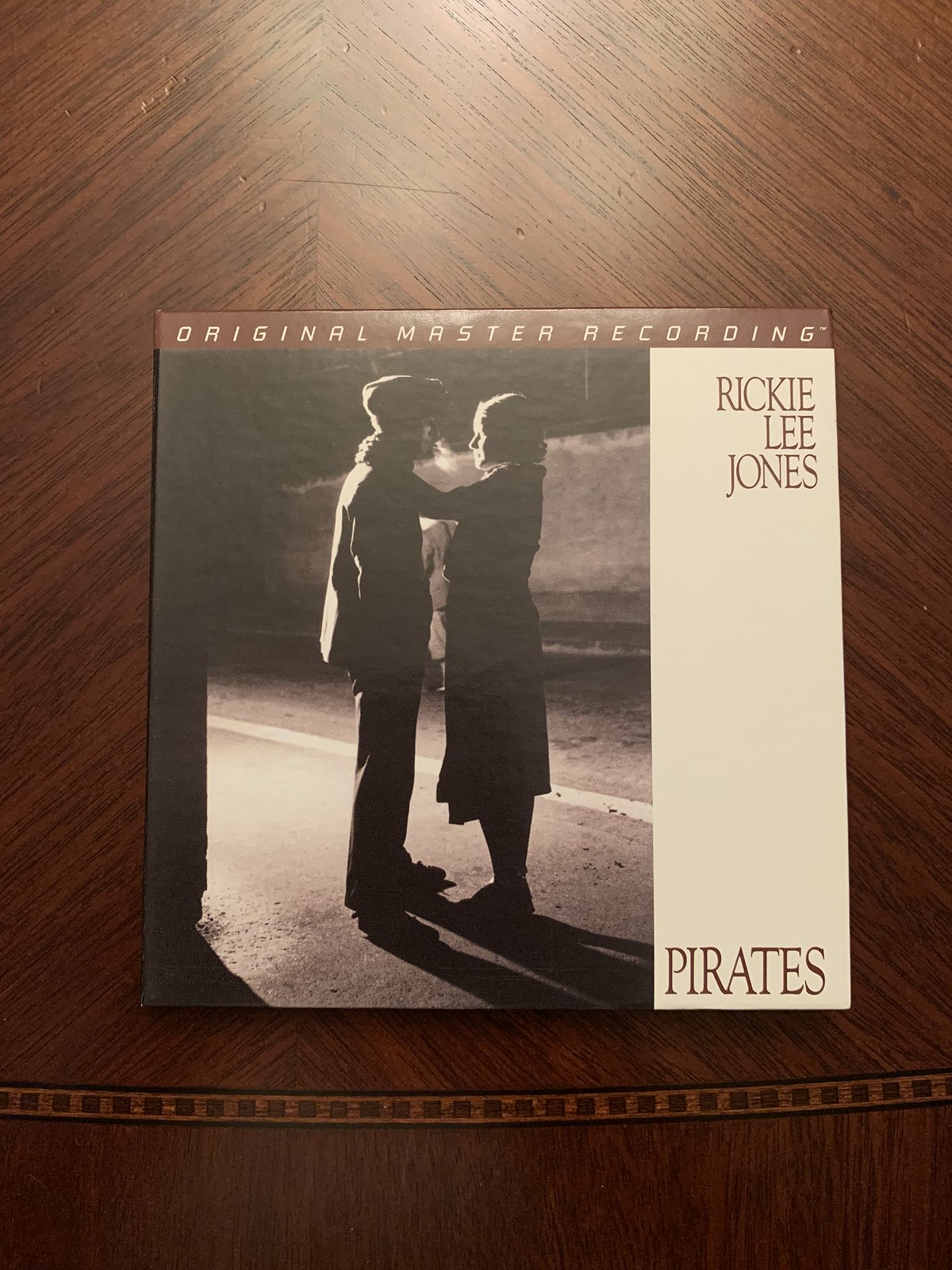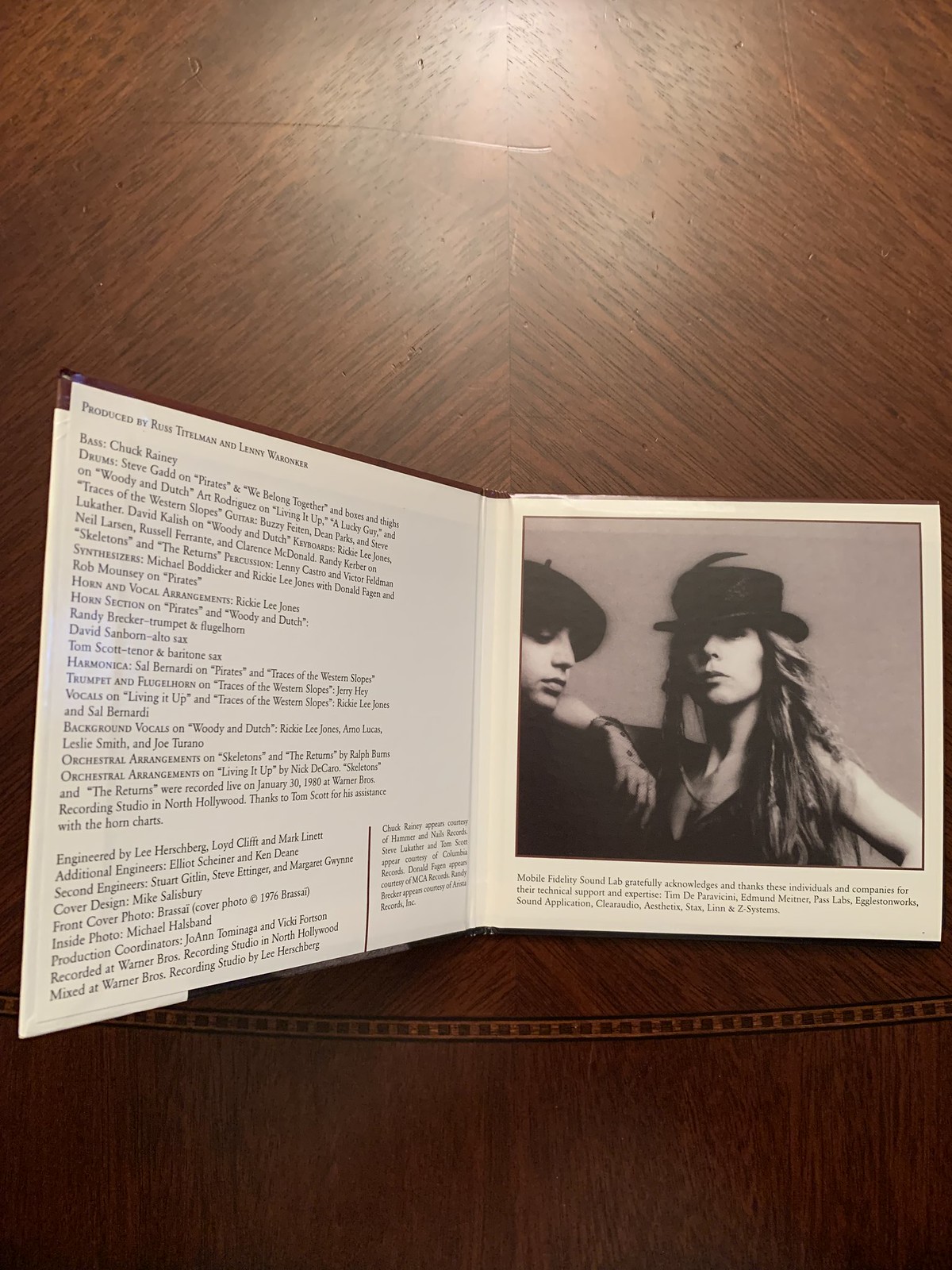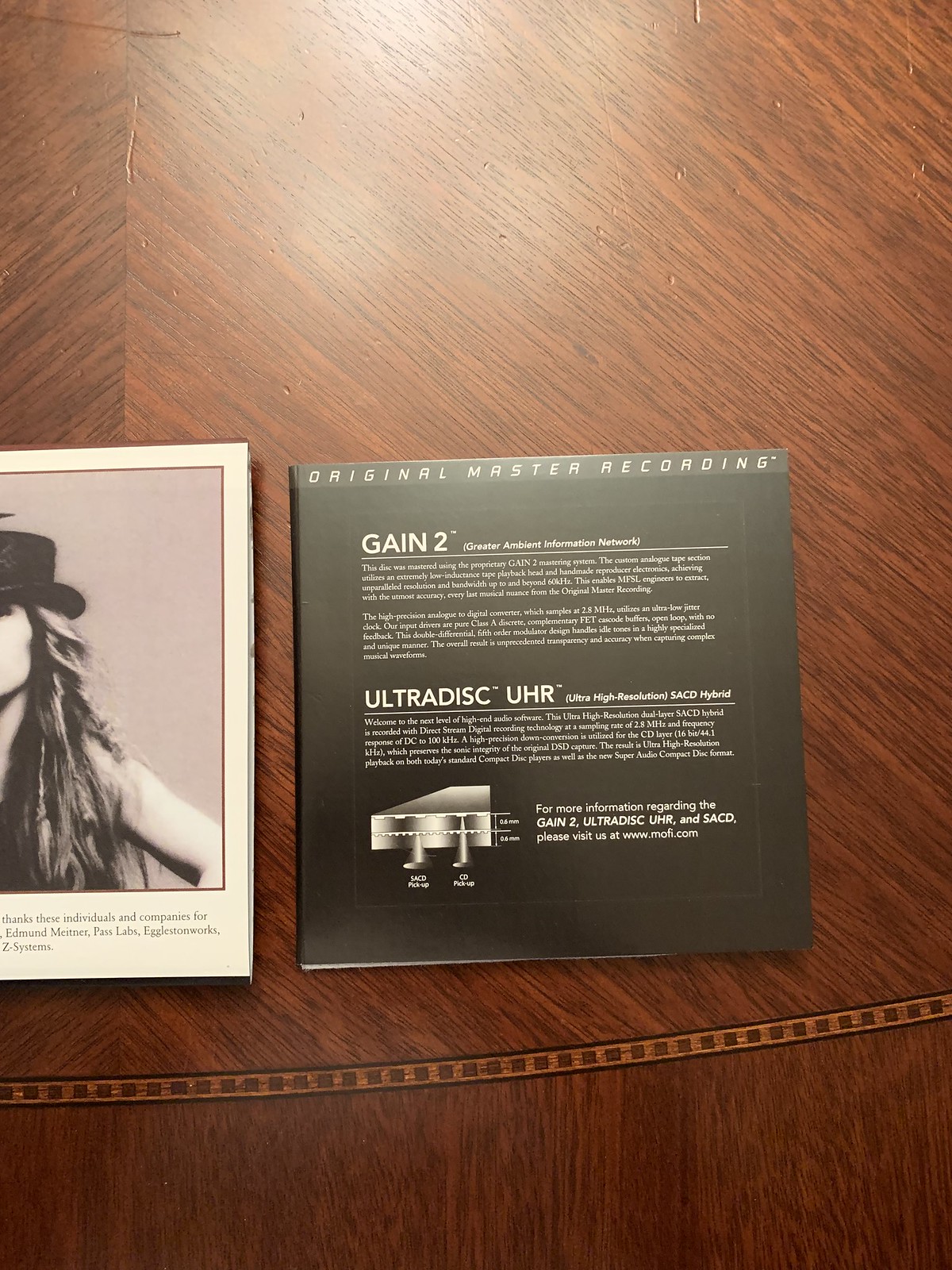This is probably behind a paywall, was in the Washington Post today, so I copied/pasted the whole article:
Mike Esposito works at his record store, the ‘In’ Groove, in Phoenix. (Caitlin O'Hara for The Washington Post)
Mike Esposito still won’t say who gave him the tip about the records. But on July 14, he went public with an explosive claim.
In a sometimes halting video posted to the YouTube channel of his Phoenix record shop, the ‘In’ Groove, Esposito said that “pretty reliable sources” told him that MoFi (Mobile Fidelity), the Sebastopol, Calif., company that has prided itself on using original master tapes for its pricey reissues, had actually been using digital files in its production chain. In the world of audiophiles — where provenance is everything and the quest is to get as close to the sound of an album’s original recording as possible — digital is considered almost unholy. And using digital while claiming not to is the gravest sin a manufacturer can commit.
There was immediate pushback to Esposito’s video, including from some of the bigger names in the passionate audio community.
Shane Buettner, owner of Intervention Records, another company in the reissue business, defended MoFi on the popular message board moderated by mastering engineer Steve Hoffman. He remembered running into one of the company’s engineers at a recording studio working with a master tape. “I know their process and it’s legit,” he wrote. Michael Fremer, the dean of audiophile writing, was less measured. He slammed Esposito for irresponsibly spreading rumors and said his own unnamed source told him the record store owner was wrong. “Will speculative click bait YouTube videos claiming otherwise be taken down after reading this?” he tweeted.
But at MoFi’s headquarters in Sebastopol, John Wood knew the truth. The company’s executive vice president of product development felt crushed as he watched Esposito’s video. He has worked at the company for more than 26 years and, like most of his colleagues, championed its much lauded direct-from-master chain. Wood could hear the disappointment as Esposito, while delivering his report, also said that some of MoFi’s albums were among his favorites. So Wood picked up the phone, called Esposito and suggested he fly to California for a tour. It’s an invite he would later regret.
That visit resulted in a second video, published July 20, in which MoFi’s engineers confirmed, with a kind of awkward casualness, that Esposito was correct with his claims. The company that made its name on authenticity had been deceptive about its practices. The episode is part of a crisis MoFi now concedes was mishandled.
“It’s the biggest debacle I’ve ever seen in the vinyl realm,” says Kevin Gray, a mastering engineer who has not worked with MoFi but has produced reissues of everyone from John Coltrane to Marvin Gaye.
“They were completely deceitful,” says Richard Drutman, 50, a New York City filmmaker who has purchased more than 50 of MoFi’s albums over the years. “I never would have ordered a single Mobile Fidelity product if I had known it was sourced from a digital master.”
Record labels use digital files to make albums all the time: It’s been the industry norm for more than a decade. But a few specialty houses — the Kansas-based Analogue Productions, London’s Electric Recording Co. and MoFi among them — have long advocated for the warmth of analog.
“Not that you can’t make good records with digital, but it just isn’t as natural as when you use the original tape,” says Bernie Grundman, 78, the mastering engineer who worked on the original recordings of Steely Dan’s “Aja,” Michael Jackson’s “Thriller” and Dr. Dre’s “The Chronic.”
Mobile Fidelity and its parent company, Music Direct, were slow to respond to the revelation. But last week, the company began updating the sourcing information on its website and also agreed to its first interview, with The Washington Post. The company says it first used DSD, or Direct Stream Digital technology, on a 2011 reissue of Tony Bennett’s “I Left My Heart in San Francisco.” By the end of 2011, 60 percent of its vinyl releases incorporated DSD. All but one of the reissues as part of its One-Step series, which include $125 box set editions of Santana, Carole King and the Eagles, have used that technology. Going forward, all MoFi cutting will incorporate DSD.
Syd Schwartz, Mobile Fidelity’s chief marketing officer, made an apology.
“Mobile Fidelity makes great records, the best-sounding records that you can buy,” he said. “There had been choices made over the years and choices in marketing that have led to confusion and anger and a lot of questions, and there were narratives that had been propagating for a while that were untrue or false or myths. We were wrong not to have addressed this sooner.”
Mastering engineer Brad Miller founded MoFi in 1977 to cater largely to audiophiles. The company boomed during the 1980s, but by 1999, with vinyl sales plummeting, the company declared bankruptcy. Jim Davis, owner of the Chicago-based Music Direct, a company that specializes in audio equipment, purchased the label and revived MoFi. During the recent vinyl resurgence (vinyl sales in 2021 hit their highest mark in 30 years), MoFi’s specialty releases sell out quickly and can be found on secondary markets at much higher prices.
Marketing has been a key element of the MoFi model. Most releases include a banner on the album cover proclaiming it the “Original Master Recording.” And every One-Step, which cut out parts of the production process to supposedly get closer to the original tape, includes a thick explainer sheet in which the company outlines in exacting detail how it creates its records. But there has been one very important item missing: any mention of a digital step.
The company has obscured the truth in other ways. MoFi employees have done interviews for years without mentioning digital. In 2020, Grant McLean, a Canadian customer, got into a debate with a friend about MoFi’s sourcing. McLean believed in the company and wrote to confirm that he was right. In a response he provided to The Post, a customer service representative wrote McLean that “there is no analog to digital conversion in our vinyl cutting process.”
Earlier this year, MoFi announced an upcoming reissue of Jackson’s 1982 smash “Thriller” as a One-Step. The news release said the original master tape would be used for the repressing, which would have a run of 40,000 copies. That’s a substantially bigger number than the usual for a One-Step, which is typically limited to between 3,500 and 7,500 copies.
(con't)
How a Phoenix record store owner set the audiophile world on fire
MoFi Records claimed its expensive reissues were purely analog reproductions. It had been deceiving its customer base for years.
Geoff EdgersMike Esposito works at his record store, the ‘In’ Groove, in Phoenix. (Caitlin O'Hara for The Washington Post)
Mike Esposito still won’t say who gave him the tip about the records. But on July 14, he went public with an explosive claim.
In a sometimes halting video posted to the YouTube channel of his Phoenix record shop, the ‘In’ Groove, Esposito said that “pretty reliable sources” told him that MoFi (Mobile Fidelity), the Sebastopol, Calif., company that has prided itself on using original master tapes for its pricey reissues, had actually been using digital files in its production chain. In the world of audiophiles — where provenance is everything and the quest is to get as close to the sound of an album’s original recording as possible — digital is considered almost unholy. And using digital while claiming not to is the gravest sin a manufacturer can commit.
There was immediate pushback to Esposito’s video, including from some of the bigger names in the passionate audio community.
Shane Buettner, owner of Intervention Records, another company in the reissue business, defended MoFi on the popular message board moderated by mastering engineer Steve Hoffman. He remembered running into one of the company’s engineers at a recording studio working with a master tape. “I know their process and it’s legit,” he wrote. Michael Fremer, the dean of audiophile writing, was less measured. He slammed Esposito for irresponsibly spreading rumors and said his own unnamed source told him the record store owner was wrong. “Will speculative click bait YouTube videos claiming otherwise be taken down after reading this?” he tweeted.
But at MoFi’s headquarters in Sebastopol, John Wood knew the truth. The company’s executive vice president of product development felt crushed as he watched Esposito’s video. He has worked at the company for more than 26 years and, like most of his colleagues, championed its much lauded direct-from-master chain. Wood could hear the disappointment as Esposito, while delivering his report, also said that some of MoFi’s albums were among his favorites. So Wood picked up the phone, called Esposito and suggested he fly to California for a tour. It’s an invite he would later regret.
That visit resulted in a second video, published July 20, in which MoFi’s engineers confirmed, with a kind of awkward casualness, that Esposito was correct with his claims. The company that made its name on authenticity had been deceptive about its practices. The episode is part of a crisis MoFi now concedes was mishandled.
“It’s the biggest debacle I’ve ever seen in the vinyl realm,” says Kevin Gray, a mastering engineer who has not worked with MoFi but has produced reissues of everyone from John Coltrane to Marvin Gaye.
“They were completely deceitful,” says Richard Drutman, 50, a New York City filmmaker who has purchased more than 50 of MoFi’s albums over the years. “I never would have ordered a single Mobile Fidelity product if I had known it was sourced from a digital master.”
Record labels use digital files to make albums all the time: It’s been the industry norm for more than a decade. But a few specialty houses — the Kansas-based Analogue Productions, London’s Electric Recording Co. and MoFi among them — have long advocated for the warmth of analog.
“Not that you can’t make good records with digital, but it just isn’t as natural as when you use the original tape,” says Bernie Grundman, 78, the mastering engineer who worked on the original recordings of Steely Dan’s “Aja,” Michael Jackson’s “Thriller” and Dr. Dre’s “The Chronic.”
Mobile Fidelity and its parent company, Music Direct, were slow to respond to the revelation. But last week, the company began updating the sourcing information on its website and also agreed to its first interview, with The Washington Post. The company says it first used DSD, or Direct Stream Digital technology, on a 2011 reissue of Tony Bennett’s “I Left My Heart in San Francisco.” By the end of 2011, 60 percent of its vinyl releases incorporated DSD. All but one of the reissues as part of its One-Step series, which include $125 box set editions of Santana, Carole King and the Eagles, have used that technology. Going forward, all MoFi cutting will incorporate DSD.
Syd Schwartz, Mobile Fidelity’s chief marketing officer, made an apology.
“Mobile Fidelity makes great records, the best-sounding records that you can buy,” he said. “There had been choices made over the years and choices in marketing that have led to confusion and anger and a lot of questions, and there were narratives that had been propagating for a while that were untrue or false or myths. We were wrong not to have addressed this sooner.”
Mastering engineer Brad Miller founded MoFi in 1977 to cater largely to audiophiles. The company boomed during the 1980s, but by 1999, with vinyl sales plummeting, the company declared bankruptcy. Jim Davis, owner of the Chicago-based Music Direct, a company that specializes in audio equipment, purchased the label and revived MoFi. During the recent vinyl resurgence (vinyl sales in 2021 hit their highest mark in 30 years), MoFi’s specialty releases sell out quickly and can be found on secondary markets at much higher prices.
Marketing has been a key element of the MoFi model. Most releases include a banner on the album cover proclaiming it the “Original Master Recording.” And every One-Step, which cut out parts of the production process to supposedly get closer to the original tape, includes a thick explainer sheet in which the company outlines in exacting detail how it creates its records. But there has been one very important item missing: any mention of a digital step.
The company has obscured the truth in other ways. MoFi employees have done interviews for years without mentioning digital. In 2020, Grant McLean, a Canadian customer, got into a debate with a friend about MoFi’s sourcing. McLean believed in the company and wrote to confirm that he was right. In a response he provided to The Post, a customer service representative wrote McLean that “there is no analog to digital conversion in our vinyl cutting process.”
Earlier this year, MoFi announced an upcoming reissue of Jackson’s 1982 smash “Thriller” as a One-Step. The news release said the original master tape would be used for the repressing, which would have a run of 40,000 copies. That’s a substantially bigger number than the usual for a One-Step, which is typically limited to between 3,500 and 7,500 copies.
(con't)







 I'm getting the new edition of Blue Train when its released in September, and it has a lot of extras on the vinyl which are not on the CD I have. It was in an article of Analog Planet online last week.
I'm getting the new edition of Blue Train when its released in September, and it has a lot of extras on the vinyl which are not on the CD I have. It was in an article of Analog Planet online last week.